A Fascinating Composer
Klaus Brecht about Louis Vierne’s “Messe solennelle op.16”
Klaus Brecht, long-time lecture at the State Academy for young musicians in Ochsenhausen and one of the editors of the school choir book series chorissimo! at carus, came across during the preperations for the 2020 concert year to the Messe solennelle op. 16 of the jubilee Louis Vierne. At first he was irritated, but then his enthusiasm grew, especially with a view to the setting of the choir passages.
When I was looking for interesting pieces for my chamber choir in preparation for the 2020 concert season, I came across works by Louis Vierne, whose anniversary fell this year. Firstly the Tantum ergo op. 2, then the Messe solennelle op 16.
My initial exploration of the Mass was primarily for quite practical reasons: it is scored for forces well within my chamber choir’s financial means – choir, accompanied by two organs, and no soloists. And from a musical point of view, it is always motivating for a chamber choir when it takes the lead role in an oratorio-style work.
I previously knew Vierne first and foremost as a composer of organ works. In my further researches about Vierne the person, three things made an impression on me.
- The organist Louis Vierne was a pupil of the famous masters of French organ music, César Franck and Charles Marie Widor. Both worked at the church of St. Sulpice in Paris, and from the professorships they held at the Paris Conservatoire, they ensured that the French art of organ playing became truly world-renowned. Vierne himself travelled worldwide as a concert organist, was highly acclaimed, and also collected funds for the renovation and rebuilding of his organ in Notre Dame. He suffered a fatal stroke whilst giving his 1,750th organ concert there, at which he was assisted by Maurice Duruflé.
(Thank goodness it was possible to save the organ after the fire at Notre Dame in 2019.)
- The person Louis Vierne was blind from birth and suffered many adversities. It is impressive and admirable that, despite his considerable disability, he was able to create such a body of artistic work.
- The composer:
- His teachers and advisers were the greatest French musicians of the end of the 19th century. He was a private pupil of César Franck and Charles Marie Widor, who directed the composition class at the Paris Conservatoire from 1896.
- Vierne’s organ compositions are masterpieces of the organ repertoire. He brought the genre of the organ symphony in particular to its high point, and had a considerable influence on the development of the art of organ playing worldwide.
- His composition students included Lili and Nadia Boulanger and Maurice Duruflé.
With this in mind I approached Vierne’s Messe solennelle which he composed in 1899–1900. It is a concertante Mass with the five sections Kyrie – Gloria – Sanctus – Benedictus and Agnus Dei. The premiere took place in 1901 at the church of Saint-Sulpice in Paris with Widor playing the main organ and Vierne the choir organ. In his Foreword to the Carus edition of the Mass, Jon Laukvik explains that Vierne initially planned a version with choir and orchestra before Widor encouraged him to compose the version for choir and 2 organs.
I have to admit that my first impressions of the work when listening to the present recording irritated me somewhat. Only when immersing myself more deeply in the score did my enthusiasm grow. And the more I study the work, the more I recognize the mastery of Louis Vierne the composer, particularly with regard to his setting of the choral passages.
Vierne scores the choir in a creative and varied way: baroque-inspired fugatos are contrasted with romantic, harmonically exciting sections. The high points are unison melodic arches, for example, in the Kyrie and Sanctus. All the choral voices can shine ‘soloistically’ in the Gloria with wonderful, grand melodies. The “Qui tollis” is enlivened by the alternation of male and female voices. The Benedictus exploits the different choir sections in the space: unaccompanied choir, choir organ and main organ which only combine in the Hosanna.
The choir organ essentially accompanies the choir. In the Sanctus it is the main actor with a jazz-inspired walking bass and a harmonically opulent feast in the “Pleni sunt caeli et terra” passage. Here, an organ pedal point on E in the main organ supplies the bass, scatters wind parts and, in the transitional measures and final cadences, provides the great orchestral sound.
The main organ opens the Mass with a tremendous sound, ascending passages in the manuals, and a striking bass figure. Diatonic ascending and descending passages and chromatic scales are frequently used as a game with scales, but are always richly varied and closely related to the text. These are very expressive points of tension in the overall composition. The main organ ends the Mass with ethereal C sharp major chords, as if from afar, and a gentle bass melody in the pedals leading into the depths.
The overall structure of the Mass is very clearly divided in its formal layout, typical of Vierne’s overall output. As a late Romantic, he illustrates the text with bold harmonies and allows himself excursions into impressionist-inspired colorfulness, interpreted through sound. As a listener, in this composition you are taken through a richly-ornamented church interior with side altars, a multitude of impressive images and figures, and a great nave as the sound space.
This is just a brief insight into a work which has made a great impression on me, and I hope that this short description will arouse the curiosity of some choral directors.
And here is an encore in memory of Vierne’s composition pupil Lili Boulanger: I think back to my time as a lecturer at the Ochsenhausen Landesmusikakademie, and to a CD project with the Orpheus Vocal Ensemble from the Akademie and the pianist Antonii Baryshesvski under the direction of Michael Alber. The CD, entitled Hymne au Soleil, contains impressive works by the composer Lili Boulanger, who died far too young. It was made in 2018, the 100th anniversary of her death (published by Carus 83.489).
Klaus Brecht was a lecturer at the Landesmusikakademie Baden-Württemberg, Germany until 2018. His main focus is on vocal work with children, young people, and adults. He is a choral director, vocal trainer, and jury member.

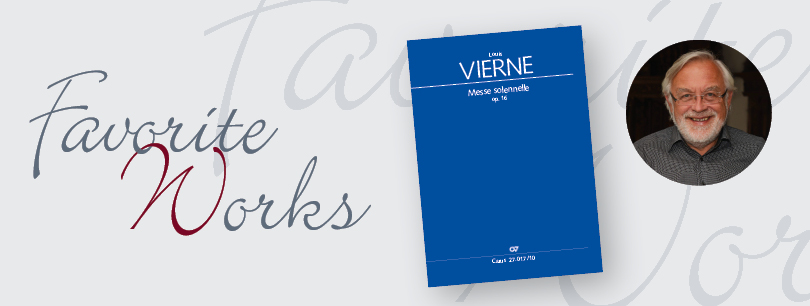
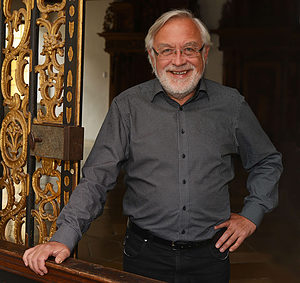
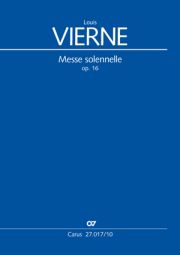
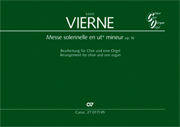
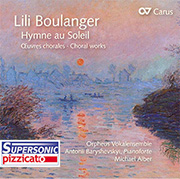


Leave a Reply
Want to join the discussion?Feel free to contribute!